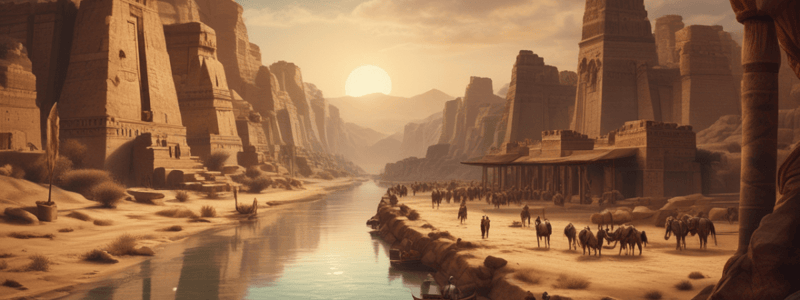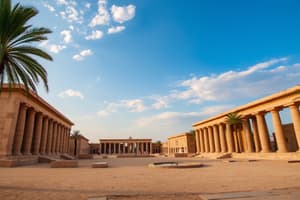Podcast
Questions and Answers
What is Mesopotamia?
What is Mesopotamia?
- A desert in Africa
- A region located between the Tigris and Euphrates Rivers (correct)
- A mountain range in South America
- An island in the Mediterranean Sea
When did the first cities develop in Mesopotamia?
When did the first cities develop in Mesopotamia?
- Around 14,000 years ago
- Around 10,000 years ago
- Around 2,000 years ago
- Around 6,000 years ago (correct)
What was the name of the writing system developed in Mesopotamia?
What was the name of the writing system developed in Mesopotamia?
- Hieroglyphics
- Calligraphy
- Alphabet
- Cuneiform (correct)
Which empires formed in Mesopotamia?
Which empires formed in Mesopotamia?
Who conquered Babylon in 539 BC?
Who conquered Babylon in 539 BC?
Flashcards are hidden until you start studying
Study Notes
- Mesopotamia is located between the Tigris and Euphrates Rivers.
- It was inhabited for nearly 12,000 years and had a stable climate, rich soil, and fresh water.
- Mesopotamia was home to some of the world's first cities, which developed around 6,000 years ago.
- The region was dotted with competing city-states and later formed empires like the Akkadian, Assyrian, and Babylonian.
- Despite constant warfare, innovation and development thrived in ancient Mesopotamia, including monumental architecture, advanced mathematics, and literacy.
- The Babylonians used their sophisticated mathematics to study the sky and created the zodiac and a 7-day week.
- The writing system developed in Mesopotamia, called cuneiform, was adapted for over a dozen different major languages and was used to record the law of the Babylonian king Hammurabi.
- Babylon was eventually conquered by the Persian king Cyrus in 539 BC, and Mesopotamia became a territory of foreign empires.
- Mesopotamia's ideas would prevail in literacy, law, math, astronomy, and the gift of civilization itself.
- Mesopotamia's cities would eventually sink beneath the sands of Iraq, but its impact on human civilization would endure.
Studying That Suits You
Use AI to generate personalized quizzes and flashcards to suit your learning preferences.




